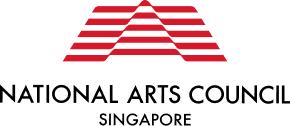Stories from the SEP Community
Read candid reflections from fellow arts SEPs and freelancers as they share their journeys to date, and some strategies that have helped them.
Life as an Arts Freelancer by Sharda Maxine Harrison

In Singapore, being a freelancer is one of the more viable options and ways to pursue an artistic career. Unlike Europe, Australia and America, Singapore does not have many agencies that manage performing artists, such as myself. Initially, the task of having to manage schedules on my own was a disaster. I often double-booked appointments and rehearsals and caused much frustration for my employers. It was only a year into my freelance career that I slowly begun to fully acknowledge that I had become a self-employed artist, and that the roles I accept and the way I organise my schedule and lifestyle would be a reflection of the actor and brand, that is, ‘Sharda Harrison’.
Being a freelancer is akin to being an incorporated company without the official documents. It is daunting because there is no protection of an employer and no employee benefits to enjoy. Five years into my career, I realised that I had to shift my mindset from ‘freelancer’ to an ‘artist entrepreneur’. That meant looking at my skill-set and analysing what might be my niche skill-set. I knew that movement work had been something that I enjoyed and thus I decided to pursue it fervently by attending all types of movement workshops and trainings. While gaining an insight into various ways of moving, I decided to link all the new-found physical vocabulary that I was learning as a performer to my acting training. Slowly over time, I had gained a practice, which in itself, turned into my own methodology of actor training, which in turn, became a valuable source of income. This niche skill-set of being a movement-based performer allowed me to engage in an arts-based pedagogy practice. Over time, my personal branding shifted from just a theatre-actor to movement artist, actor, host and teacher. The more skills I acquired, and the more I linked these new skills to my actor training, the more confident I grew with managing my income, my own monetary benefits and my long-term health and wealth insurance. I cannot stress enough the value of creating a “rice bowl” and being able to sleep at night knowing that one has a roof over one’s head and food in one’s stomach.
It is harrowing to note how certain artists still believe in the notion of the “struggling artist”. Personally, I think that perhaps the word ‘struggle’ has been misconstrued for generations. It is a given that every artist struggles – we struggle to understand humanity, struggle to put a piece of art together, struggle to form community and outreach with the messages that we want to convey to the public. However, to financially struggle in order to make art, in my opinion, should be reserved as a myth. The biggest lesson that I have learnt as a freelance artist is how to make art that is authentic, honest, and still able to make an income from it. This does mean that we have to build on our skill-sets and focus on a myriad of ways and approaches to art-making. Perhaps we too, as artists, must become more demanding and savvy in how we handle our contracts and negotiations, because no matter how old or young we may be, an artist deserves to be able to live a rich, wealthy and abundant life.
I look forward to the day when we artists begin to speak more on how art and a decent income come hand in hand, and the myth of the struggling artist remains just that, a myth.
Freelance Sustainability – Myth or Reality? by Jeremiah Choy

It is a dream to be able to earn a living from a hobby or a passion. And to do so as a freelancer is an even bigger dream. So is it a myth or a reality?
After being a freelancer, on and off for about 20 years (since 1997), I can proudly say it is a reality. However, it does take a mindset change.
First of all, that hobby or passion has turned into a means for your living – you have to earn enough to sustain your day-to-day expenses, cater to your needs and wants and plan for your future. It is no longer doing it “just for fun”.
Secondly, you need to have a strategy – a business and marketing plan. What will set you apart from the rest of the market? Who are your target consumers or buyers? How do you expand your market?
Thirdly, what are your long-term plans? How do you keep up with market demands, be ahead of the curve and be in constant demand? How are you relevant to the market? What are your skill sets? How do you sell them?
You need to realise that your freelance choice is now your Career!
Since the start of my freelance career, I am mindful of the 4 Cs: Concept, Copyright, Cash and Contract.
As an art-maker, my Concept is my asset. There is a difference between a brief and a concept. A brief is skeletal information of what the client wants happen. The concept, on the other hand, is a detailed thought process that I will share with the client. I earn my money through the concepts I generate. My thought-process is my cash cow.
As a creative person, I own the Intellectual Property (IP) rights over the concepts I have created, especially Copyright. I lay claim to these rights and make sure that I make money through them. If any client wants to take over any or all of my IP rights, they can either pay me a lump sum to buy the right/s outright from me, pay a licensing fee or pay me royalty fees.
Cash is important. There is no point rushing or doing a project for a client if the client does not pay my fees on time, or in full or at all. I make sure I get paid by carefully planning milestones or periodic payments. Having a good cash flow plan is necessary for a freelancer as I do not know when my next project or pay cheque will come. I do suggest having 3 to 6 months cash in the bank to ensure there is no necessity to do underpaying jobs just to meet financial emergencies.
Finally, I always insist on a Contract. This is to save me time and effort should either party default on the agreement as a contract spells out the rights and obligations of both parties. If I do not get a written contract, I will put in writing to my client to confirm the details of our discussion, state my fees and deliverables. It will become evidence should there be any dispute later on.
As a freelancer, my reputation and integrity are important. And very often, it is these two virtues that bring clients back again and again.
As a freelancer, I set my rules. My resources are limited, so I have to make many difficult choices on how to use them strategically to generate income for myself.
And with this mindset change, sustainable freelancing can be a reality. I have been living my dream and am happy that my passion is my work and my work is my passion.
Five Things I Learnt About Communication by Michael Lee

(photo courtesy of Singapore Art Museum)
I am having breakfast when my phone receives an email notification. It is Tay Tong, who wants me to share about my life as an arts freelancer for this article. His email puts a smile on my face. Other than communicating a clear intention, the email also states the essay’s word count, deadline and honorarium amount. I am not left wondering if this is another pro bono request. I have all the information I need to consider the invitation. Just like managing expectations and creativity, good communication skills make a freelancer’s life more tolerable. I hope my list of tips here – gathered from some of my experiences – offers a guide, or at least, some consolation.
1. Take care of yourself.
Meeting people who could give you a museum show is an important opportunity. But when you get so stressed out and start to sound incoherent during the meeting, you become someone even you do not want to hear from again. The key is not to try so hard to be someone else. Know yourself towards and through self-care. Know when you are nervous and speaking too fast, and slow down. Know when you are rambling, and consciously pause or ask if your listener is following. Self-care is about protecting yourself and creating optimal conditions where you can shine.
2. Try and try again.
If you struggle with communicating in a certain way, try a different way. Try all ways. Try your own way. And if all of that does not work, there is one thing you should never forget…
3. We are imperfect, but a strong work ethic is still important.
We must recognise our own flaws, some of which could be hindering our development while others are actually blessings. A fellow artist shared with me that a collector bought his work because she found his anxiety during his artist talk to be a sign of authenticity. Yet, using the ‘imperfect’ card too often is not sustainable. If you know you won’t be able to meet a deadline, request for a slight extension of time before the deadline looms too close, not after. Alerting issues ahead of time spells maturity. Apologising for unpunctuality is bad excuse.
4. Don’t get too personal.
There is a running joke that the best way to start a meeting is to gossip or engage in small talk, and there is some truth to that; asking “How’s your day?” is a good way to gauge the other person’s current frame of mind. However, overdoing it can complicate matters. Saying negative things about someone who is not present to defend himself or herself is unfair and risky, and your listener may turn out to be a fan of the subject of your rant! Base your opinions on facts, and strike a balance between acknowledging strengths and weaknesses if asked to opine on works you did not create. Not getting too personal at work does not mean stopping your personality and unique visions from coming through. It simply means you need to prioritise the task at hand rather than allow personal issues like self-doubt and prejudices to overwhelm the work. You are hired to solve problems, not add to them.
5. Keep the communication channel open.
In a committee situation, there will be disagreements. You know some things are wrong, or you realise someone in the team is free-riding, not pulling his weight, or being malicious. You feel obliged to call this person out. Yet, as soon as you raise your concerns, you get screamed at for telling the expert how to do his job. And you thought you were saving the day! When the truth must be told, there are ways to do so, such as to agree first and then to disagree, for example, “I get where you’re coming from, but—” This way, you keep the communication channel open and avoid turning it into a battlefield. I half-suspect that the one reason I still get to do freelance gigs is that I am able to deliver them as competently and truthfully as I can without leaving a trail of burnt bridges.


